Lambert: I’m not sure that a “social elevator” is the metaphor I find most appealing for redistribution. How about one of those little folding stepladders that you see in kitchens?
By Laurence Boone, Chief Economist, OECD, and Antoine Goujard, Senior Economist, OECD.Originally published at VoxEU.
The ‘yellow vest’ demonstrations in France appear, at least in part, to be another example of the anti-globalisation sentiment that has emerged in a number of OECD countries. This column argues that the movement is also rooted in the country’s broken social elevator. Redistribution through taxes and social transfers is not sufficient to curb the inequality in opportunity, which is mostly linked to the educational system and perpetuates economic and social situations from one generation to the next.
The recent ‘yellow vest’ demonstrations in France could well be simply a variant of the regional and social divides potentially linked to the same trend towards a rejection of globalisation that has emerged in a number of OECD countries (Pastor and Veronesi 2018, Rodrik 2017). That is probably partly true, but the reasons for this movement are also rooted in a profound inequality of opportunity (OECD 2018). It takes more than six generations in France for a person at the bottom end of income distribution to reach the mean. More than 15% of 15-year-olds have poor numeracy and comprehension skills, which are likely to lead to difficulties in finding work later. Of all the OECD countries, only Hungary shows more social determinism than France.
Figure 1 Intergenerational mobility is low
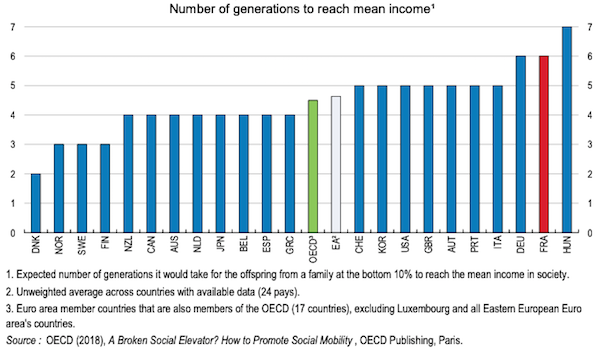
Inequalities of Opportunity that Are Reproduced Throughout the Educational System and from One Generation to Another
Contradicting the oft-repeated assertion, France suffers not from insufficient income redistribution but from an inequality of opportunity that perpetuates economic and social situations from one generation to the next. In other words, the social elevator is broken and has been for some time. That inequality of opportunity hits not only the poorest – it also to some extent affects the middle classes.
Disparities between socio-professional categories and regions take root at a very early age. Although much early childhood education and care is provided through the social system and with state support, only 30% of children in the least well-off third of the population benefit from ‘formal’ childcare services (nurseries, daycare or qualified childminders), compared with nearly 60% for the population as a whole. It is partly a question of access – such services are more or less well-developed depending on the municipality or neighbourhood. Yet they are important factors in a young child’s early learning, development, and socialisation.
The disadvantages of a low-income socioeconomic background persist at school. The OECD’s PISA studies assess the educational performance of 15-year-olds. The studies show that 15% of schoolchildren in France have low skills in reading comprehension and mathematics, one of the highest rates across OECD countries. They also show that the level of influence of social background on educational attainment is one of the highest among OECD countries. This is particularly true in mathematics, a subject which, as is well-known, has a considerable effect in France on access to the best educational opportunities. Here again local differences play a significant part, since it is more difficult to attract experienced teachers to some schools and some geographical areas concentrate pupils in difficulty.
Figure 2 The education system perpetuates considerable disparities
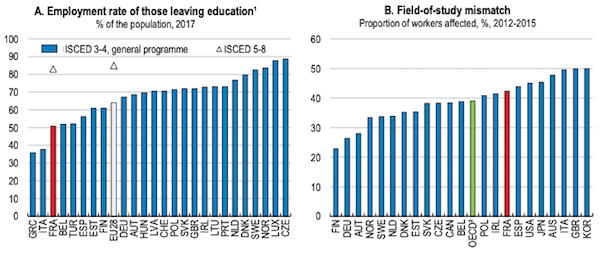
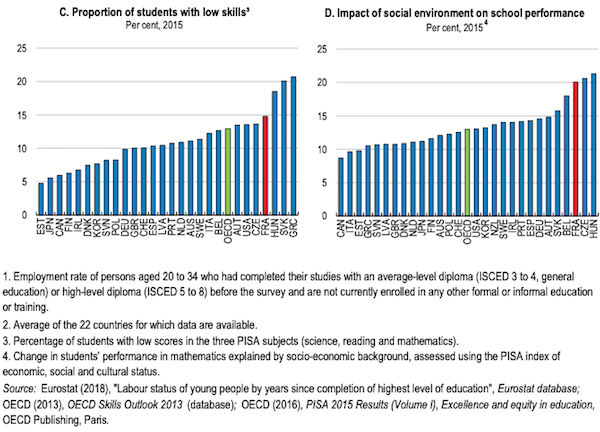
Differences in educational level affect access to employment. The proportion of young people not in education, employment or training (NEET) in France is higher than the EU average. Access to employment differs considerably according to level of qualification, and the premium for the most highly qualified is significantly higher than elsewhere. The employment rate of those leaving the educational system with an average general-education diploma (secondary or non-higher post-secondary) is 51%, one of the lowest in the EU (only Italy and Greece score worse). In contrast, the employment rate for higher-education graduates is 83%, close to the EU average.
These differences in access to employment are persistent, not least because the lifelong learning system fails to remedy them among the low-skilled. The high proportion of low-skilled young people persists from one generation to the next and the proportion of low-skilled adults is also one of the highest in OECD countries – France ranks fifth among countries where adult skills are lowest as measured by PIAAC, the OECD’s adult skills survey. This is not corrected by access to training. First, the low-skilled are 50% less likely than others to have access to training. Second, the rate of participation in formal training in the array of available lifelong learning options is again one of the lowest among OECD countries. Recent reforms are seeking to change this situation, but much remains to be done. While recent one-off plans have helped to give the unemployed access to training, the same does not apply to the inactive.
Figure 3 Access to training remains unequal, 2016
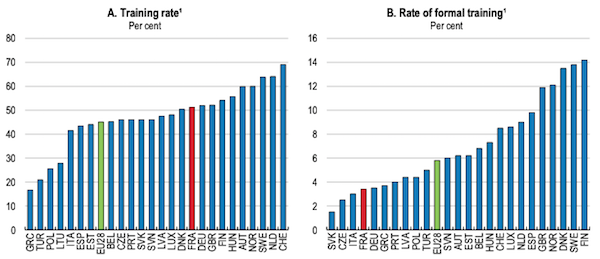
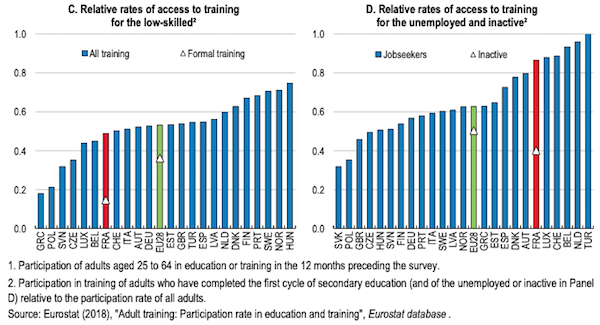
Income gaps reflect disparities in access to employment and in taxation. In France, the income of the poorest 20% of the population, as well as the median disposable income, did not increase between 2008 and 2016. The targeted reduced rates of social security contributions may have significantly lowered the cost of labour for those on the minimum wage, but those contributions continue to weigh heavily on the median wage. Employers’ contributions as a proportion of gross wages are very low for the minimum wage (4% after the latest reductions), but rise to 36% for the median wage, a unique gap among OECD countries. Although this helps to provide welcome support for low-skilled jobs, it probably also holds back the increase in income between the minimum and the median wage, which may partly explain why there has been little gains in the purchasing power of the low-paid.
Redistribution corrects the most flagrant inequalities but does little to benefit the middle classes. The redistribution system in France is extensive and does much to correct poverty through substantial transfers to the least well-off households. Nonetheless, income inequalities before taxes and transfers are high in relation to the OECD average. Taxes and transfers, including unemployment benefits and pensions, merely reduce inequalities in income distribution to the OECD average. That suggests less redistribution of transfers net of tax to the middle classes.
Figure 4 Income inequalities are tempered by taxes and social transfers
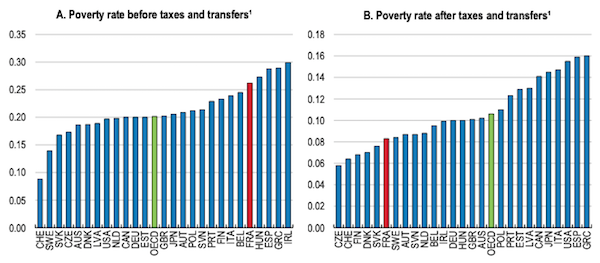
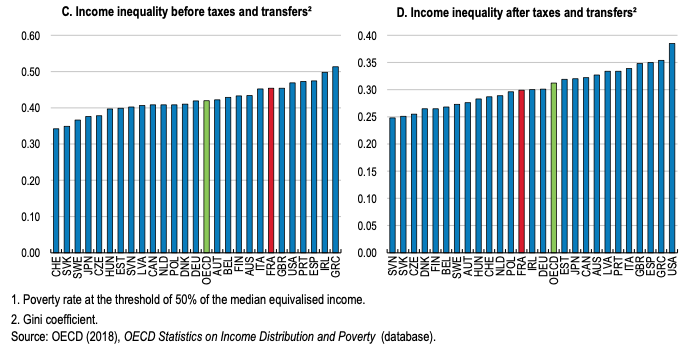
Substantial housing costs add to these income disparities. Housing costs are a major item of basic household expenditure, and housing as a share of household consumption in France is higher than the European average. Again, a substantial social housing stock and significant housing benefits help to correct this for the least well-off households. Not all such households receive them, however, and middle-class households even less so.
Concluding Remarks
Redistribution through taxes and social transfers is a powerful way of reducing income inequality but substantial inequalities of opportunity remain, mostly linked to the educational system. Redistribution supports the standard of living of the poorest households but fails to correct disparities in the middle of the distribution range. Above all, it is not sufficient to curb inequality of opportunity linked to socioeconomic background or territorial inequalities. The urgent need to give everyone a chance to succeed will require reform of the education system to ensure that through education and training every child has an opportunity to advance, from early childhood and throughout his or her life, and that every adult who has missed a step can catch up. The next OECD survey of France, to be published in April, will contain recommendations along those lines.


I do think the ‘social elevator’ metaphor is quite apt. Until the ’60 – ’70s, people of any background could rise in society. We have seen the son of a blacksmith as Prime Minister, the childre of farmers becoming artists, writers engineers and so on. So the French edutaional system did allow to move.
But recently, this system is as broken as most elevators in the high-rises of the suburbs, and you need to climb your way out of despair one step at a time.
…or slide down the banister to Oblivion…
I’m not sure that you can show a causal link between the social elevator (“ascenceur social”) and the Gilets jaunes, but they are both aspects of the same problem.
As Jeff says, social mobility has declined a lot. Since the 1950s, the elite schools which produce the leaders of French society have become steadily more socially selective. In the 1950s, around a third of the graduates were from the working class. The percentage is now too small to measure. Elites who came from these schools have settled in the big cities, got good jobs, and had children who themselves now go to private schools (which many middle class parents now use in despair) and on to the same kind of selective and expensive higher education their parents had. Thus, there is effectively an urban ruling caste which reproduces itself. These days, though, it’s also highly diverse in terms of gender and ethnicity, so that’s all right then. It doesn’t matter if entry to it is largely based on wealth.
If you live in the suburbs or the provinces, not only are you unlikely to be able to have the best prospects for your children, but even basic educational opportunities may be lacking. Not only are about 20% of 11-year olds functionally illiterate, and about the same number incapable of anything beyond basic arithmetic, but these are average figures. France is now heavily divided geographically by wealth (there are areas of Paris where this is noticeable just crossing a major street), and in poorer areas, the level of illiteracy is dramatically higher. This is partly because of concentrations of non-French speaking immigrants, but it’s mostly because successive governments just haven’t cared. Resources have not been provided, and, until recently anyway, elites haven’t really cared much about the education of their inferiors.
So if you are a lower middle-class family in precarious circumstances, you can at least hope for something better for your children. But if they attend a school where a number of children don’t speak French, where teachers come and go rapidly because they can’t stand the stress, where gangs control most of what goes on, and offer the only plausible careers, and where the authorities clearly don’t give a familyblog about the education of your children then, well, it’s another reason for getting your yellow vest out.
Thanks for this comment.
As you write:
Thus, there is effectively an urban ruling caste which reproduces itself. These days, though, it’s also highly diverse in terms of gender and ethnicity, so that’s all right then. It doesn’t matter if entry to it is largely based on wealth. …
France is now heavily divided geographically by wealth (there are areas of Paris where this is noticeable just crossing a major street), and in poorer areas, the level of illiteracy is dramatically higher. This is partly because of concentrations of non-French speaking immigrants, but it’s mostly because successive governments just haven’t cared. Resources have not been provided, and, until recently anyway, elites haven’t really cared much about the education of their inferiors.
As an aside, both you and the Colonel have made the point that the lower income and working class have been shut out of political representation for a long time. Now, when their economic condition causes them to protest, the political elite ‘ritually smears them as a diversion’ from the real problems. (hat tip to you both) The nature of the smears falls into declaring the working class who object to this division of resources either r-cist or f-scist or both.
My aside is this: incorrectly naming things disarms the power of language. It is too much crying wolf. When the real wolf appears will anyone listen? There are growing far right, f-scist movements in EU, UK, and US, but it is not the GJ or Brexit voters or Trump voters who are the problem. The economics are the problem. The center-left fell into neoliberal economics and idpol decades ago. They’ve spent so much time demonizing lower income voters and working class white guys that when I hear a center left pol or pundit say ‘white r-cist patriarchy’ I tune out. They have misnamed things for so long that they have disarmed the power of their language. And this at a time when far right movements growing, largely in response to the political center lefts’ embrace of neoliberal economics. The neoliberal center left pols might rethink their economics instead instead of scolding the people most hurt by their economic policies. The wealth transfers didn’t end. They just started going the other way; going from the bottom 90% to the top 10%, instead of the post-war tax programs of going from the top 10% to everyone below. Tax cuts for the wealthiest, austerity for the rest.
Being in the EU has not lessened that change, might eve have supported it where the 10% look to the globe and ignore their own country’s need. My 2 cents.
I’ve had similar experience and agree with your general take on this. However, in my experience at least the problem is that any suggestion that a rethink might be a good idea just falls on deaf ears. It seems that having taken the moral high ground, the “enlightened” idpol-obsessed liberal is very much unwilling to come back down and try to see the working class as anything other than enablers of the current r-cist order.
> Not only are about 20% of 11-year olds functionally illiterate, and about
> the same number incapable of anything beyond basic arithmetic…
I’d say your points here are well made, with one quibble: how many 11-year-olds anywhere ARE capable of numerical reckoning beyond basic arithmetic?
The Boone & Goujard analysis is excellent but, for people who do not know France well, their choice of words can be misleading. “Education” in the English sense correlates rather poorly with “diplômé” in French. To a ludicrouse extent, careers in France – even funding for start-ups – are almost completely determined by what diploma one has. Few foreign qualifications count. Family connections too, as Boone & Goujard imply, are much more important in France than almost anywhere else except Italy. Income tranfers by themselves hardly scratch the surface of this deeply ingrained social stagnation. Ensuring that schools at all levels were really equal throughout the country would change things dramatically. Nothing of the sort is on the national agenda. Very few French people know enough about other countries to grasp the comparative differences.
“Very few French people know enough about other countries to grasp the comparative differences.”
Yes, well, how many Americans have ever seen where USA! USA! ranks on these charts?
*****
I’ll tell ‘ya, the crap I hear “centrist” Democrats spouting in support of Good Ole’ Joe, Cory, Kamala and Beto — anybody but that old socialist — is stomach-churning…
For those who would like the topic of this post in book form, I suggest reading the book Dream Hoarders (i.e. opportunity hoarding as the above post suggests).
https://www.brookings.edu/book/dream-hoarders/
https://www.theatlantic.com/business/archive/2017/06/the-hoarding-of-the-american-dream/530481/
I’ve never liked the idea of a “social elevator” because at the end of the day, for every person moving up quintiles on the social elevator, there is exactly one person moving down to replace her. What’s far more important is to maintain the standard of living of the bottom quintile as high as possible so that social mobility becomes less of a big deal — in both directions. By emphasizing social mobility, one is basically adopting a bourgeoisie-centric point of view in that everyone should be fighting tooth and nail to become professionals and the losers have only themselves to blame for their low-paid working class jobs. A better approach is to attempt to place value, both economic and cultural, on the working class lifestyle and jobs. This is of course very difficult within the current context of neo-liberal globalisation but in many nations we are starting to see resistance to the globalist ideology.
Since the keys to social mobility seem to be cognitive ability combined with ambition, in some ways it is a shame if the upper classes keep poaching the best and the brightest from the working classes. There’s a term for this, something like elite co-option. But if the best and brightest working class offspring stay in the in their class due to a lack of social mobility maybe it is not great for the individual but good for the class as a whole as presumably these people would become leaders in the fight for class justice. The Gilets Jaunes may be an example of this.
So the most important element of a just society is to limit the differences in wealth between the top and bottom quintiles. For even a society with huge amounts of social mobility but with wide gaps in wealth is far less just than a society with little social mobility but with more modest differences in wealth. I’m thinking about as an example Scandinavian countries twenty or thirty years ago.
It’s slightly more than that, because decisions about things like income distribution are made by elites, so it depends very much on who those elites are. If a reasonable proportion of those who make these decisions come from what the French call the “popular classes”, then those decisions will reflect, at least to some extent, the interests of ordinary people. The problem now is that these decisions are taken by people at the top of government, the civil service, industry and finance who come from the same privileged background, have much the same worldview, know each other, and move into each others’ jobs. It can’t be a bad thing if some of the decision-makers have at least some grasp of real life.
Sure but you are assuming people from popular backgrounds once they fight their way to the top, will fight for their former social class and not for their current one. Also it seems very passive to leave these types of decisions to elites since they will obviously favour their own kind. That’s why the popular classes have to fight for to put pressure on the elites whether on the street or at the ballot box if the elites are stupid enough to give the people an actual choice.
One thought I had in reading your comment is that if their were radical social change then this may function something like a veil of ignorance where if the elites weren’t assured of the social class their children would end up in they may have an interest in pushing for more social fairness. I think the reality is though that elites do everything they can to game the system for their children so as to avoid having to find out what living in the bottom quintile is like.
Partly, yes. I was meaning not simply people at the very top, but also local and national politicians, journalists, people working in local government, even leaders of civil society and trades unions. Such people today (even the last named) are often too divorced from those they lead or govern, and, critically, are no longer subject to pressure from below, but pressure from above. It’s that that we need to fix.
Absolutely. There’s a reflexive desire for a political and economic system where everyone is above average (ht to Lake Woebegone), without the willingness to confront its impossibility. We could pretend it worked when “clean work” (office jobs) were expanding to replace a lot of manual labor jobs. And in the U.S. where there were always others to do the low-paid unpleasant work: minorities and new immigrants. We should think about whether the person doing the low-status unpleasant work has the wherewithal for as good a dignified life as the person with the high status position, regardless of what advantages or disadvantages each had.
@Alain: This is the comment I was looking for, so thanks for saving me the trouble of writing it.
Age at commencement of tracking/sorting students college-bound v. blue-collar bound (not sure on the terminology there) might be indicative. This source says UK and US do it latest and Germany does it earliest. France is in the middle. It must be discouraging to be the parent of a bright 10 year old kid and the school tells you they are not on the college track.
INTERNATIONAL EVIDENCE ON SCHOOL TRACKING: A REVIEW
While correcting inequality through “training” or education is the right thing to do, no net change in income distribution occurs as a result.
What changes is who gets a job not how many, replacing someone that has a job with someone else (competition). The ten dogs and eight bones paradox.
Training, if it creates jobs at all, creates them for the trainers while putting trainees deeper in debt (unless funded by the state).
Most training programs I’ve been around (continuing education for professionals for example) are best characterized as churn…no one really wants to be there, including the instructor, the sessions start late, knock off early with 2 hours for lunch…
…in the quest for “credentials”.
Then there’s “job training”.
I have a friend (college educated) who’s been struggling to find a decent job, not minimum wage. He took a training course for Insurance Adjusters, for which there is supposedly good demand. Not sure how much it cost him, I can’t bring myself to ask. No one will hire him because he doesn’t have any experience.
So he’s 38 yrs old, working for minimum wage at Publix, part-time because they keep his hours just below the threshold for benefits. I suppose he could start his own deli…
ah yes supposedly good demand. I’m frankly beginning to doubt there is actually “good demand” for almost anything at least in the U.S.. Qualified employees exceed demand for almost everything.
But yea France, always struck me as having a much more rigid class system than the U.S. (although probably a better health care system – who doesn’t?) and heaven knows the U.S. is far from paradise.
Can we just agree that capitalism, even in it’s welfare state variants CAN’T solve the problems caused by capitalism? (even above only Nordic countries seem to be doing anything right and we’re so far from that ever really being plausible within U.S. capitalism that …)
In France, lack of appropriate technical training is a well-recognised problem. The technical Baccalaureat, introduced thirty years ago, is too theoretical, and also has an underserved reputation as a refuge for thick who can’t hack philosophy or economics. As a result, there’s a great shortage of artisans and people with manual skills. The irony is that builders, carpenters, masons etc. are in short supply, and earn a good living. Proper training of young people in those areas, as well as a change in social attitudes, would help to reduce unemployment, and have a small but positive effect on wealth distribution.
This is a problem across Europe. I have seen people with PhDs going into building furniture (NOT running a furniture maker, but actually doing the carpetntry) as they found it paid more. But still, all of those have problems attracting young (15-18 bracket).
This was interesting compared to New Zealand, where I remember my uni educated friend talking about her uni-going daughter going out with a carpenter and she saying “Cool! She should stay with him, he’s a good kid who can do stuff, they would be taken care of in no time”. I thoght about most of the Europe I know, and there it would be seen as a huge step down and “she could do better” attitude.
Why is it necessarily a problem for PhDs to build furniture? I bet they do a really good job. When we treat carpentry as a job that only the stupid should have, then we wind up with a lot of stupid carpenters making stupid mistakes.
It would be nice if there was room in nearly ever profession for smart/skilled people to flourish, instead of some professions sucking up that entire type of person.
From personal experience I can attest to the fact that there is such a pool of “superior” persons in the trades. This is where the myth of the Meritocracy goes to die.
No matter how “smart” one is, the extractionist forces define the wage levels available by measures that have nothing to do with the intrinsic worth of the people doing the work. “Worth” has come to be defined by externalities.
As for some occupations “sucking up” the totality of smart/skilled people; my experience shows there to be a weak correlation between Intrinsic Merit and Reward. The idea that PhD’s would be generally superior to “stupid” people in any manual trade is ludicrous. Some faint strata of genius level people might be such polymathical prodigies. Such do exist. The rest of us reside comfortably in the middle section of the human Bell curve.
We all deserve to flourish.
Please, read my comment again.
Did I say anywhere that it’s a problem for PhDs to build furniture, or that carpenters were dumb?
My points, to repeat, were:
– PhDs found carpentry paid more than the jobs they could have got with their PhDs (and we’re talking here high maths, and complex theoretical physics stuff, not a PhD-in-doing-something-obvious). If they could feed their faimilies doing the jobs they got the PhDs for, they would have preferred that, as it was what they really loved;
– despite it actually paying very well, young people ignore this type of jobs;
– not a small reson for that is because manual(ish) jobs like capentry are, in certain societies (like a lot of continental Europe in my experience) looked at as not socially attractive enough, but are in some other societies (like say New Zealand).
Nothing above has to do anything with dumb/smart.
As an aside, the fact that a title has a social standing attached to it in continental Europe is not necessarily a bad thing. It gives social standing based on something else than a celebrity status/money. Unfortunately, this is changing, and imo it’s not a change for better.
“…The ‘yellow vest’ demonstrations in France appear, at least in part, to be another example of the anti-globalisation sentiment that has emerged in a number of OECD countries….”
I doubt any of the Yellow Vests think about anti-globalisation. This is typical of any so called ‘economist’ thinking. (the debate of whether or not economists can actually think will be postponed for now). Goujard and Boone aren’t being ingenuous here, that’s too generous a term. They’re fulfilling their function as elite academics. They should address the problems with globalization instead, but that would entail some serious objective thinking.
The”sentiment” of the Yellow Vests is rebellion against being pushed to the bottom by the Elite. This is happening in most First World countries, including the US. What’s wrong with low-skilled labor? Nothing. Not every one can climb to the top; that’s been the case for years, but folks used to be able to raise a family on one low-skilled job, without assistance. Thanks to globalization, we’ve exported most of our low-skilled jobs overseas. Some years back, a friend lamented that his kids couldn’t get traditional summer jobs at fast food places, because those places wanted to keep their “permanent staff” even though no one worked full time.
It’s a sign of the times.
So if that’s “anti-globalisation”, then I’m all for it. Let the label-makers have their day.
Lambert, I’m surprised you felt the need to reprint this drivel.
It’s really a waste of space.
. .. . .. — ….
I didn’t care much for the yellow vests. It shows they don’t get the capitalist system and its debt based expansions that have been going on since the late middle ages. Inequality is a feature of the system and always has been outside the WWII driven “central planning” era where mixed economies came about.
I feel a lot of “me me me” with them, no different feeling than a upper middle class family. Anti-globalization? Please. This is where Marxists and Libertarians unite to defeat group think. Let the system since 1980 collapse and let real gdp fall back to where it should be without the Madoffian/Trumpian ponzi scams going on without unsecured debt. I can absolutely tell the Yellow Vesters, inequality will solve itself quite a bit, quite a bit.
I see it as The Nation vs. The State, and insofar as The State is dependent on globalization, the movement is anti-globalist. As you point out, the left v. right paradigm is outdated. Cats and dogs can protest together in common cause without having to make peace. Look at David Duke’s support for Ilhan Omar. Apart from the fact that, “I didn’t see that comin’!”, it does go to show that commonalities are 3D.
The correlation between a society’s economic inequality and upward mobility has been well demonstrated in the US – the “Great Gatsby Curve” and the like. Here is a study representative of the genre:
Economic despair: The vicious circle of inequality and social mobility
https://www.brookings.edu/blog/social-mobility-memos/2015/05/29/economic-despair-the-vicious-circle-of-inequality-and-social-mobility/
The question now, surely, is how to reverse this condition in an era of unprecedented late-capitalist wealth accretion by plutocratic sectors in advanced economies that is politically achievable? “Green New Deal” and other non-incremental or meliorist proposals, I suppose, is a start, but the pushback will be fierce and unyielding, and the way popular governmental programs are savagely neutered during their passage through the legislative sausage-maker by armies of lobbyists in the pay of the plutocratic class hardly inspires confidence. Well, at any rate the issue does provide much work for academics, think-tanks, and their ilk, whose upward mobility has never been questioned or put at a precarious risk.
since they have become very popular lately, the social elevator has turned into a social escape game.
Since this piece is about France, I was immediately reminded of the great French film “Elevator to the Gallows.”
See: https://www.youtube.com/watch?v=euB6PWW6tcI
“studies show that 15% of schoolchildren in France have low skills in reading comprehension and mathematics”
…this really makes them more vulnerable to various types of exploitation; convenient for the Overlords…
But- low skills compared to Who???
Surely I was not alone in noticing that the USA is worse than the OECD median in most of these measures. The implications are clear. I’m beginning to lose hope in the ability, even the willingness of America to pull out of the nosedive we find ourselves in.